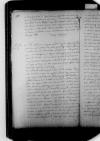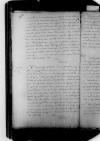List #425
Alfonso de VALDÉS do Ioannes DANTISCUSToledo, 1529-02-14
Regest polski:
Valdés cieszy się z listu Dantyszka. Pisze o swoim uwielbieniu dla niego. Wyraża obawę, że Lalemand wymknie się karom, gdyż działają na jego korzyść podobni mu wpływowi nikczemnicy, na szczęście jednak cesarz [Karol V] postanowił, że nie będzie on więcej dopuszczany na dwór. Teksty Dantyszka [epicedium i epitafium] na temat Lalemanda spodobały się ogromnie kanclerzowi [Mercurino Gattinarze] i przyjaciołom. Valdés czeka niecierpliwie na pozostałe obiecane teksty. Martwi się, że nie może przesłać Dantyszkowi do zaopiniowania kopii swojego dialogu o zdobyciu Rzymu ani tekstu dotyczącego pojedynku (ratio singularis certaminis), ponieważ Ioannes [Juan Saganta?] jest cieżko chory, drugi skryba [Gonzalo Peréz?] zaś — zajęty w kancelarii. Przypuszcza jednak, że teksty te nieprędko ukażą się drukiem. Uważa uwięzienie Lalemanda oraz gwałtowną śmierć nuncjusza papieskiego [Baldassare Castiglione] za karę bożą za krytykę dialogu. Historyjka o biskupie Osmy (Oxomensis) [Juan García de Loaysa y Mendoza] rozbawiła Valdésa i przyjaciół, uznaje ją za godną umieszczenia w Pasquillusie.
Kanclerz ucieszył się ogromnie z listu Dantyszka, zgodził się na wszystkie jego poprawki do przywileju [tj. dokumentu nadania tytułu eques auratus]. Dantyszek jest u niego w wielkich łaskach. Valdés przesyła Dantyszkowi przywilej i list do króla [tj. nową wersję pisma, zwalniającego Dantyszka ze służby na dworze cesarskim]. Valdés odpowiada na pytanie Dantyszka o Alfonsa de Virues — jest z nim w przyjaźni, bardzo ceni sobie jego zalety, a wady wybacza. Opowiadał już wcześniej Dantyszkowi, że pośredniczył w załagodzeniu sporu miedzy Viruesem a Erazmem [z Rotterdamu]. Pogłoska o planowanym wyjeździe cesarza do Granady jest fałszywa — ma on wyjechać z Toledo 1 marca do Monserrat, tam spędzi Wielkanoc i na początku maja popłynie do Italii.
Valdés komentuje historyjkę o ciężarnym mnichu — hermafrodycie. Podczas pisania tego listu zaskoczył go Perrenot, przeczytał list Dantyszka i wspólnie śmiali się sardonicznie. Perrenot przekazuje Dantyszkowi pozdrowienia, mimo że nie został przez Dantyszka wspomniany. Pozdrawiają go również kuzyni kanclerza:Bartholomaeus, Hieronymus a Ranzo, Georgius, który właśnie przybył z Italii, i Iacobus a Gattinaria, oraz oficjał genewski (officialis Gebenensis) [Eustace Chapuys] i A(ntonius) Longus. Marliano zgodnie z obietnicą napisze, a Suarez pozdrawia tylekroć, ile jest kłamstw u Marka Aureliusza. Valdés przekazuje pozdrowienia dla Izabeli [Delgada] i dzieci [Juany Dantisca i Juana Dantisco].
| odebrano Valladolid, [1529]-02-18 Rękopiśmienne podstawy źródłowe:
Pomocnicze podstawy źródłowe:
Publikacje:
| ||||||||||||||||||||||||
Tekst + aparat krytyczny + komentarz Zwykły tekst Tekst + komentarz Tekst + aparat krytyczny
Clarissimo viro, Domino
Salutem plurimam.
Non est, cur neque ego apud te, neque tu
vicissim apud me pluribus verbis utamur, cum nota explorataque
utrique nostrum sit mutua inter nos benevolentia vel potius mea in
te pietas, quam si<c> ut animo concepi, ita et
verbis exprimere aut operibus comprobare daretur,
sat, scio, diceres spe tua te aut opinione minime frustratum esse. Quam mihi
fuerint tuae cf.
De
Fabula
Hic quoque rumor erat,
De monacho praegnante nihil aliud scio,
quam illum hermaphroditum
esse iamque septimo mense foetum gestare. Ego certe non tantum
admiror factum, sed qui fieri potuit, ut inter tot distensos monachos concipere potuerit, aut cur eadem opera non concipiunt meretrices. Neque enim credendum est
in tali officina segniorem operam illum aut, si mavis, illam navasse.
Cum haec scriberem, deprehendit me dominus
Vale.
Tuus
[1 ] cf. fr. Antonio de Guevara, Libro áureo de Marco Aurelio, [Sevilla], [1528-02-27] ⌊Libro áureo de Marco Aureliocf. fr. Antonio de Guevara, Libro áureo de Marco Aurelio, [Sevilla], [1528-02-27] ⌋, one of the most noted works of a Spanish historian and moralist Fray Antonio de Guevara (1481-1545), first published in Sevilla, 1528-02-27. The book consisted of fictitious correspondence of the Roman emperor Marcus Aurelius, cf. cf. Agustin Redondo, Antonio de Guevara (1480?-1545) et L'Espagne de son temps. De la carrière officiale aux oevres politico-morales, Service de reproduction des theses Universite de Lille III, 1978 , chapter “Les Antécédents du «Relox de príncipes»: le «Libro áureo de Marco Aurelio»”, p. 465-522⌊REDONDO 1978cf. Agustin Redondo, Antonio de Guevara (1480?-1545) et L'Espagne de son temps. De la carrière officiale aux oevres politico-morales, Service de reproduction des theses Universite de Lille III, 1978 , chapter “Les Antécédents du «Relox de príncipes»: le «Libro áureo de Marco Aurelio»”, p. 465-522⌋


